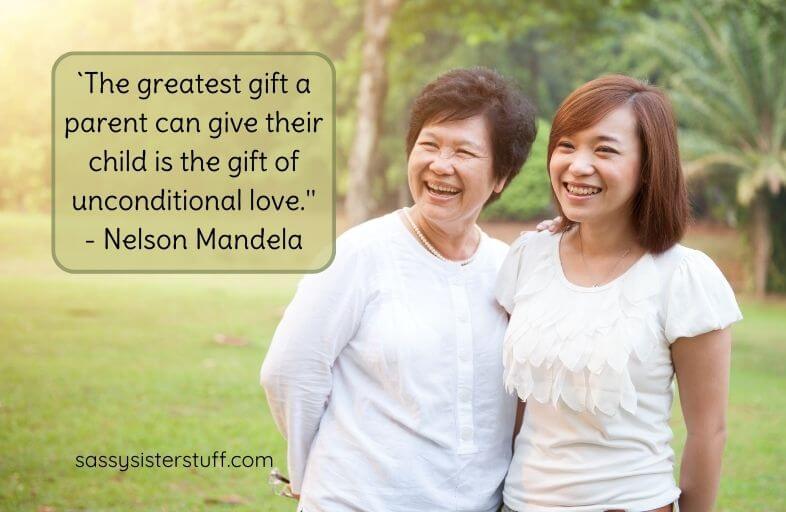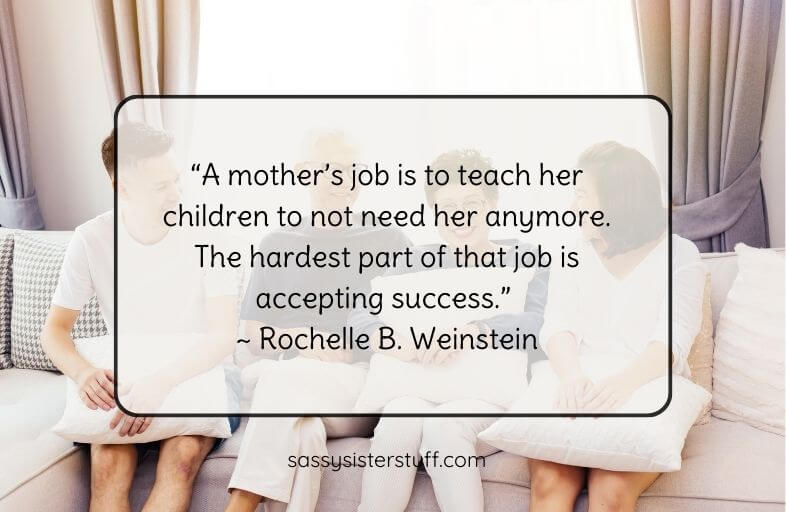13+ Tips for Improving Relationships with Adult Children
Maintaining healthy relationships with adult children can be tough. As kids grow into young adults and start their own lives, the dynamics of your connection naturally shift.
For many middle-aged and senior women, this transition brings unexpected challenges. You might feel a loss of control or face misunderstandings as your roles change.
But here’s the truth: building a meaningful and strong relationship is possible with effort, understanding, and patience. Whether tension stems from unresolved issues or clashing opinions, there are ways to stay connected and improve your bond.

Let’s explore common challenges and practical strategies to create stronger, more fulfilling relationships with adult children.

Common Challenges in Relationships with Adult Children
Certain challenges tend to arise when children become adults and start leading independent lives. These roadblocks can impact your ability to maintain a good relationship.
Generational Differences and Expectations
Your experiences and values likely differ from your child’s. Maybe you grew up believing in a traditional work ethic or lifestyle, while young people embrace ideals that seem foreign to you.
These differences can lead to misunderstandings and even frustration even with your most conscious effort.
For example, you might prioritize financial stability over risk-taking, yet your adult children may dream of starting their own business or following an unconventional path.
When expectations don’t align, frustration often follows and the parent-child relationship suffers.
Communication Barriers
Ever feel like you’re talking but not really being heard? Communication gaps between parents and adult children are common.
Misunderstanding someone’s tone or intentions can escalate minor issues into full-blown arguments. Lines of communication become difficult.
Sometimes, emotional walls get built over years, especially if you are having trouble expressing your thoughts openly with your adult kids.
When this happens, meaningful conversations can become rare and distance grows between you.
Boundary Issues
Not knowing where to draw the line can hurt even the closest relationships. Some parents overstep unknowingly, while others withdraw completely, fearing rejection. Healthy boundaries become blurred.
Respecting boundaries goes both ways. It’s essential to balance being involved with giving your children the space and emotional support they need to grow and thrive independently.
Unresolved Conflicts
Past grievances don’t just go away when your kids grow up. Old arguments, childhood mistakes, or resentments can linger, leading to underlying tension. Young adult children can be particularly susceptible to this problem.
If these issues aren’t addressed, they can create emotional distance that’s tough to bridge later. You may not even realize how much the past is affecting the present until it’s too late.
Life Transitions and Role Shifts
As your children grow into adulthood, your role as their primary caregiver and supporter changes.
This transition can leave you feeling uncertain. You might wonder where you fit in their new, independent adult children’s lives.
Adjusting to this change requires redefining your relationship—not just as a parent but as a source of mutual support.

Tips for Improving Relationships with Adult Children
Strengthening your bond takes intentional effort and unconditional love. Use these practical strategies to build understanding, resolve conflicts, and reconnect for a healthier relationship.
1. Practice Active Listening
Listening is one of the simplest yet most powerful ways to connect. Instead of thinking about your next response, focus on what they’re saying. Let them use you as a sounding board.
Ask questions to show genuine interest. Paraphrase their words to confirm you understand. When they feel heard, they’re more likely to share openly, especially in their times of need.
2. Respect Their Independence
Your child is no longer a kid. They make their own decisions—right or wrong—based on their own judgment. Respecting this independence shows trust and good intentions on your part. This may require that you put aside any difficulties from their teenage years.
While offering guidance is okay, avoid trying to control their choices because you may end up crossing new boundaries. Let them chart their course, even if it doesn’t align with yours.
3. Set and Respect Boundaries
Healthy relationships thrive on boundaries. Be clear about your own needs but also honor theirs. For instance, if they ask for privacy or time to themselves, respect that. Remember, they have their own thoughts now and can make their own decisions.
Similarly, communicate if you feel something isn’t working for you. Setting boundaries and honoring boundaries fosters transparency and mutual respect.
4. Let Go of Past Resentments
Holding onto old grudges only weighs both of you down. Think about ways to address unresolved conflicts without reopening old wounds.
Forgiveness doesn’t mean forgetting—it means choosing to move forward and letting it go. Start fresh and focus on building trust in the present.
5. Avoid Unsolicited Advice
It’s tempting to offer advice, but doing so can backfire if it’s not wanted. Instead, it’s best to wait for them to ask. Advice is more effective when it’s invited.
Unsolicited opinions may come across as criticism, even if your intentions are good. Let them figure things out their way even with the biggest challenges.
6. Show Appreciation and Gratitude
Look for opportunities to thank your child or recognize their efforts. Expressing gratitude shows you value their contributions and proudly stand in their corner. It fosters positivity in both directions.
A simple “thank you” can go a long way toward creating a respectful, loving relationship.

7. Learn Their Love Languages
Everyone feels love differently. Understanding how your child gives and receives love—whether through words, actions, or time—can help you connect on a deeper level.
If they express affection through acts of service, offer to help them with tasks. If their love language is quality time, spend meaningful moments together. If their love language is through words, be aware of what you say and how you say it to them.
8. Be Open to Change
Relationships evolve. Stay flexible and adapt as your child’s needs or circumstances shift. Be aware of the dynamics of your current relationship.
Be willing to redefine roles as your adult child grows older or enters new stages of life. You might find that your relationship with adult daughters is different from your relationship with an adult son.
Let them know you’re here to support them through all seasons of their journey.
9. Avoid Comparisons
Constantly comparing adult children to others can hurt their self-esteem and damage your bond. Whether it’s a sibling, friend, or someone in the community, no one likes feeling judged or inadequate.
You’ll have a better relationship with each of your adult children if you avoid comparisons. Celebrate what makes your adult child unique. Pointing out their strengths shows you believe in them.
10. Keep Communication Open
Make regular communication a priority—even if it’s just a quick text or phone call. Staying connected strengthens the relationship and builds trust over time.
Be proactive without being overbearing. Respect their schedule and pace, but don’t let too much time pass between interactions.
Sometimes it might even mean you have to hold a poker face while you’re talking to them face-to-face. They will know when you’re not being genuine.
11. Be a Supportive Presence
Your role as a parent may have changed, but your child still needs your support. Be available when life gets tough, whether they need someone to talk to or a helping hand. They still have very real emotional needs.
Support doesn’t mean solving every problem—it means being there and showing you care unconditionally. It also means respecting their personal space.
12. Celebrate Their Achievements
Marking milestones helps build a positive connection. Whether it’s a promotion, new job, or personal goal, acknowledge their hard work. Even if you are struggling with the feelings of empty nest syndrome, be careful to acknowledge their accomplishments.
Your adult child’s needs don’t change—they need to hear that you are proud of them. Celebrating their success shows you’re genuinely invested in their happiness. It’s a simple way to stay involved without being intrusive.
13. Seek Professional Guidance When Needed
If the relationship feels too strained or toxic to repair alone, consider mental health therapy. A neutral third party such as a family therapist can help address past wounds, improve communication, and rebuild trust.
This is a good time to release issues you may have with your own parents, also. Don’t let years of past family issues impact your relationships with your own children.
Seeking help is a sign of strength, not failure. It shows you’re committed to making the relationship better and want to develop a strong bond for the future.

How to Foster a Lifelong Connection
Building a lasting bond with your adult children requires continuous effort. Focus on creating meaningful experiences and navigating challenges together.
Remember, you are still the adult in this relationship. Give your children grace. They are not going to be perfect and may be struggling with the dynamics of this new relationship, also.
Shared experiences are the glue that binds relationships, and finding activities you both enjoy can make your connection stronger and more meaningful.
Explore hobbies together, like gardening, crafting, or trying new recipes in the kitchen. If your adult child enjoys a specific sport or fitness activity, join in or cheer them on.
Creating new traditions can also be a beautiful way to build memories. These don’t have to be elaborate—think cozy family movie nights, monthly coffee dates, or an annual holiday cookie-baking session. Even a tradition as simple as sharing weekly updates via text or video call can keep you connected.
The key is to make these moments consistent and intentional, so they become cherished rituals for both of you.
Related Article: Amazing Benefits of Spending Quality Time with Family
Encourage Mutual Respect
Respect is a cornerstone of any strong relationship, and it becomes even more crucial as your child steps into adulthood.
Acknowledge their autonomy, listen to their opinions, and approach disagreements with an open mind. This not only reinforces your respect for them but also encourages them to treat you with the same consideration.
Remember to avoid offering unsolicited advice or opinions unless asked, and give them the space to make their own decisions—even if you don’t always agree.
When both parties feel heard, valued, and appreciated, the relationship naturally flourishes with trust and understanding.
Adapt to Extended Family Dynamics
As your child’s family grows, so do the relationships and responsibilities that come with it. Whether it’s welcoming in-laws, embracing stepchildren, or nurturing bonds with grandchildren, flexibility and understanding are essential.
Make an effort to build positive relationships with the extended family. A warm and respectful attitude toward your child’s partner and their family shows your support and sets a positive example.
At the same time, respect your child’s need to prioritize their nuclear family, and avoid putting pressure on them to always choose you first.
By navigating these dynamics with grace and kindness, you can maintain a strong connection that evolves alongside their growing family.

Emerging Adulthood: Insights from Jeffrey Jensen Arnett
Jeffrey Jensen Arnett, a renowned developmental psychologist, introduced the concept of emerging adulthood—a distinct life stage that spans the late teens through the twenties.
His groundbreaking research highlights the unique challenges and opportunities young adults face during this period, such as identity exploration, self-focus, and navigating the transition to independence.
Arnett’s work emphasizes that this stage is marked by significant growth and change as young adults figure out who they are and what they want in life. He explains that this phase is often fluid, with individuals moving in and out of education, relationships, and various career paths as they shape their futures.
Understanding emerging adulthood is crucial for fostering strong relationships with adult children. Recognizing that this is a time of exploration, uncertainty, and self-discovery can help parents provide support without overstepping.
Arnett’s research reminds us that patience, open communication, and encouragement are vital as adult children navigate this complex yet exciting phase of life.
By embracing these insights, you can better understand your child’s experiences and build a deeper, more empathetic connection as they journey through this transformative stage.
This may not be an easy time for anyone and you may not find much common ground, but hang in there while your child experiences young adulthood.

Finances can be a delicate topic, especially when it comes to offering financial assistance to your adult children. While your support can provide them with a safety net, it’s essential to strike a balance that encourages independence.
When considering financial help, open communication is key. Discuss expectations and boundaries clearly to avoid misunderstandings. Whether it’s a one-time gift or ongoing support, ensure that both parties are on the same page about the terms and any repayment, if applicable.
It’s also important to assess your own financial situation. Helping your children should not come at the expense of your long-term financial security.
Offering guidance on budgeting, saving, and managing money can be just as valuable—if not more so—than monetary support.
By fostering their financial independence, you empower them to navigate adulthood with confidence and responsibility.
Your relationship with your adult children is one of the most important bonds you’ll ever have. While challenges are inevitable, making an effort to maintain open communication, set boundaries, and respect their independence can pave the way for a closer connection.
Take practical steps today to strengthen your bond. With patience and understanding, you can create a lifelong relationship filled with love, trust, and respect.
You may enjoy these Related Articles about relationships:
- 25 Fun Ways to Reconnect with Your Spouse in Midlife
- Why is Love Important to Your Well-Being in Life
Best wishes!
Love to ALL! ~ Susan







